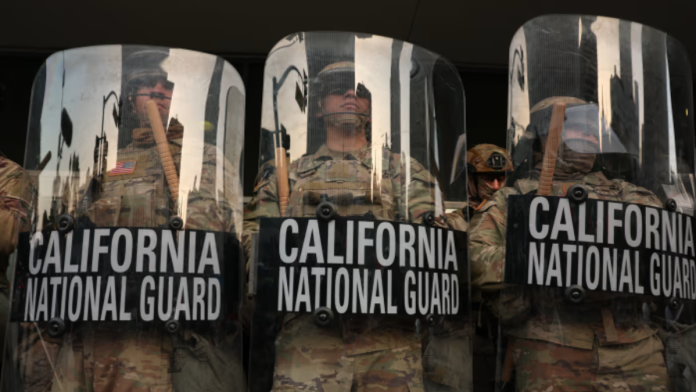A federal judge, Karin Immergut, has stopped the Trump administration from sending National Guard troops from California and Texas to the city of Portland. The decision came after an emergency hearing where the court ruled that such deployment violated earlier restrictions. The ruling adds new weight to an ongoing legal battle over who has the authority to control the National Guard in times of unrest.
Emergency Order Halts Deployment
The case unfolded quickly over the weekend. The Trump administration had already tried to federalize members of the Oregon National Guard. That attempt was blocked by Judge Immergut, who said there was no evidence of widespread violence in Portland.
Soon after, the administration shifted its attention to troops from other states. Plans were made to send about 300 California National Guard soldiers to Portland. In addition, Defense Secretary Pete Hegseth authorized Texas National Guard members to be deployed to Oregon and Chicago.
Lawyers for Oregon, led by attorney Scott Kennedy, and California, represented by Deputy Attorney General Jane Reilley, told the court this was a direct attempt to bypass the earlier order. They argued that sending in troops from other states was an attack on state sovereignty. Judge Immergut agreed and signed an order preventing the deployment of any National Guard troops to Oregon for the next 14 days.
Trump announces plans for 100% tariffs on foreign-made movies
Legal Clash Over States’ Rights
The fight is centered on who has the power to decide when and where the National Guard can be used. Normally, governors such as California’s Gavin Newsom and Oregon’s Tina Kotek control their state’s National Guard. Federal law allows the president to step in under special circumstances, but those circumstances are rare and limited.
In this case, the Trump administration argued that federal troops were needed to protect federal agents and property in Portland. Government lawyers, including Eric Hamilton, said protests in the city created unsafe conditions.
But state officials disagreed. They said protests had not reached the level of chaos that would justify a federal takeover. Court papers described the deployment as an “unlawful federalization mission” and accused the administration of turning soldiers into political tools.
Judge Immergut, who had already blocked the use of Oregon’s National Guard, pressed Hamilton to explain why sending in California and Texas troops did not break her earlier ruling. When no clear answer was given, she ruled that the move violated her original order.
Rising Tensions Between States and Federal Government
This legal fight adds to tensions between the Trump administration and Democratic-led states. President Donald Trump had already sent thousands of National Guard troops and hundreds of active-duty Marines to Los Angeles earlier in the year. That deployment was challenged in court and later ruled illegal, though the case is still being appealed.
YouTube to pay $24.5 million to settle lawsuit related to President Trump’s account ban
Reports at the time showed that many of those troops were not even on the ground in the city, raising questions about whether the show of force was necessary. Critics argued that the presence of soldiers only made protests grow larger.
As of last weekend, about 300 National Guard troops remained stationed near Los Angeles. Those were the same troops the administration tried to shift to Portland. State leaders, including California Attorney General Rob Bonta, argued that removing them from California hurt important missions such as firefighting and border security.
The court’s new order has put a temporary stop to those plans. It means no National Guard soldiers from Oregon, California, or Texas can be sent to Portland for now. Lawyers from both states called the ruling a victory for the rule of law, saying it protected their soldiers from being used in ways their states did not approve.
The White House, in response, defended Trump’s actions. Spokesperson Abigail Jackson said the deployments were necessary to protect law enforcement and federal property. She criticized state leaders, including Governor Newsom, for opposing the plan and accused them of siding with lawbreakers.
The battle over troop deployment continues to play out in multiple courts, but for now Judge Immergut’s order keeps National Guard soldiers from being sent into Portland.


